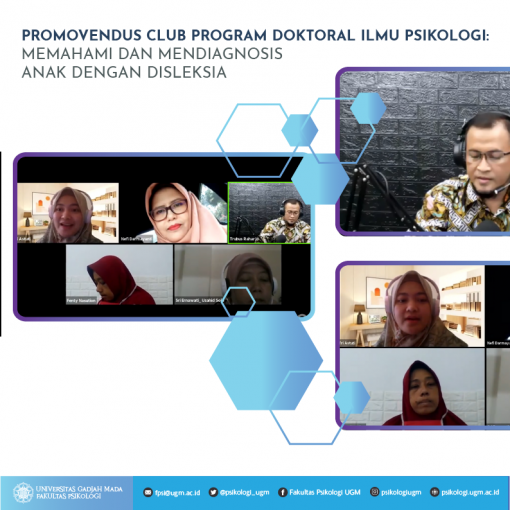
Promovendus Club, Doctoral Program in Psychology held an event with the topic “Understanding and Diagnosing Children with Dyslexia” on Friday (16/4). The event which takes place at 09.00 WIB is part of the colloquium which is routinely held every 2 weeks by the Promovendus Club online.
Attending this event Dr. Trubus Raharjo, S.Psi., M.Sc., a psychologist as a presenter who is a lecturer at Muria Kudus University and an alumnus of the UGM Psychology Doctoral Study Program. There were several things conveyed by Trubus through this event, including how to recognize the symptoms of dyslexia learning difficulties, how to diagnose children with dyslexia, and how to treat children with dyslexia. “So far, information about dyslexia, especially for teachers, educators, and psychologists is still very minimal. There are several communities and so on, but most of them are held by pediatricians, usually so, “said Trubus.
Dyslexia according to The International Dyslexia Association is a specific learning difficulty that comes from neurological factors. “That dyslexia is a specific learning difficulty because later it will differentiate it from other general learning difficulties, such as autism, retardation, intellectual disorder, intellectual disability,” explained Trubus. Children with dyslexia have problems that generally appear to have difficulty reading, writing and spelling. “Although later there are other behaviors that characterize a child with dyslexia or even an adult with dyslexia.” According to Trubus, early detection of dyslexia can be done in the pre-school period, although it is usually seen in the first year of school children.
Dyslexia is said to be a specific disorder because the reference for the diagnosis of dyslexia is DSM-5 and is included as a neurodevelopmental disorder in the category of specific learning disorders. Furthermore, there are three main things that make dyslexia a specific learning disorder, namely biological factors whose context can be genetic, accident, or collision. Then, there are abnormalities at the cognitive level related to the ability to understand, reason, and also logic. In addition, dyslexia is also associated with behavioral signs, such as the inability to write, read, and spell.
The behavioral disorders seen in children with dyslexia include, like talking to themselves, children at their will, comorbid ADHD or speech delay, and so on, including often saying words or sentences that are upside down. “Now this is what sometimes causes emotions to children because they think the adults around them, father, mother, and siblings do not understand what is being asked,” explained Trubus.
The topic that was raised at the event this time was quite attractive to the community, as evidenced by the registrants who entered beyond the capacity that had been provided. This makes the committee have to provide a YouTube link so that participants can still join even though they don’t get a zoom link. A complete explanation regarding dyslexia can be listened to on the YouTube channel of the UGM Psychology Doctoral Program.
